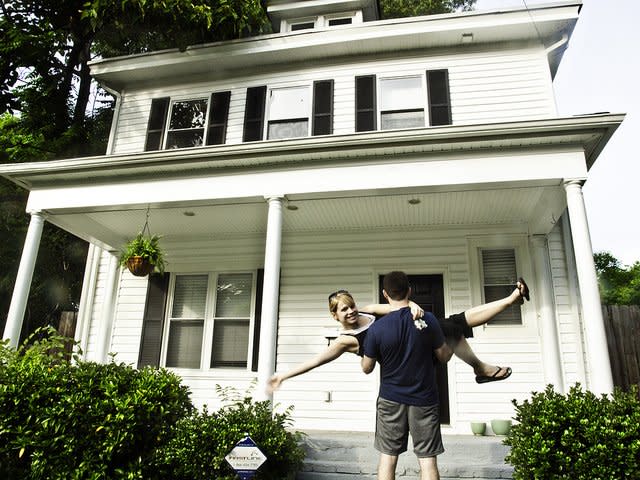Renting vs. Buying: Which Is The Best Option For House Hunters?

Flickr/houseofjoyphotos
When it comes to deciding whether to rent or buy your next home, it all boils down to the golden rule of real estate: location, location, location.
Renting can make complete sense in one city, while it would be a money drain in another. And the length of time you plan to stay in that area has a big impact on the bottom line as well.
But in general, housing values are becoming a much better investment than they were just a few years ago. And if you're looking to settle down, it's probably best to seal the deal.
"It depends on your local market," said Brendon DeSimone, a Zillow real estate expert. "There's no one answer for the whole country."
Here's what you should think about before you sign the dotted line on a lease or a mortgage.
Location
You first need to dig into data on your local market. There's no one geographic area that's taking the housing market by storm, but many areas of the manufacturing-ravaged Midwest are a good bet. Trulia points to Detroit, Toledo and Cleveland as some of the most attractive areas for home buying right now.
It's also wise to check Zillow's Breakeven Horizon index, which takes into account the price of a down payment, purchase costs, and utility and maintenance fees in different cities. According to the index, it would take 8.3 years before buying a home makes more financial sense than renting a home in San Francisco. But in Tampa, that number is much smaller, at 1.6 years.
The New York Times also has a great rent vs. buy calculator.
The bottom line: Don't commit to buying until you check local data. But even in urban areas, buying is often a better deal right now.
Longevity
Renting is ideal for someone who plans to live in an area for fewer than three to five years. If you were to buy a house in that time, you might not get the return on your investment.
If you buy a house and sell it within a couple years, DeSimone said you'll lose about six to seven percent of the money you put in to a home through the cost of selling — including transfer taxes and the real estate commission.
Granted, you shouldn't rent forever. Apartment rents are e xpected to rise by about 4 percent annually through 2015 . Home prices are also bouncing up as the housing market improves, jumping by about 10 percent in February alone .
"If you have any doubt about long-term longevity, then you should be renting," he said. "Don’t waste your money."
The bottom line: Rent if you can only commit to staying in the same spot for a year or two. If your job will keep you in the same place for several years, it's a good time to buy.
Maintenance
Before buying, you also need to be ready to pay higher insurance and maintenance costs on a home than you would on a rental apartment.
When your sink gets a leaky pipe in a house, you can't call your landlord to bring down his toolbox to fix it for you. And those unexpected costs can potentially add up to thousands each year, depending on the age of your home. Many websites recommended stashing away 1 percent of your home's worth for annual maintenance costs.
The bottom line: If you're not ready to pay out of pocket when your fridge is on the fritz or your hot water heater mysteriously shuts down, go with renting.
Upfront cost
Before buying a home, potential owners need to ensure they have at least 20 percent of the cost for a down payment. Although you can sometimes get by with less, most buyers must meet that threshold to qualify for a typical home loan, DeSimone said.
Twenty percent down is often called the "magic number" for a house down payment and can come with lower interest rates compared to loans for people who can only afford 10 percent.
Upfront costs for renting an apartment typically include a down payment of at least one month's rent and a security deposit, which you can recoup at the end if no damage is done.
But buyers also can take advantage of current record-low interest rates. And they don't have to deal with landlords or fluctuating rents.
The bottom line: If you can't afford to put down 20 percent of the home's cost, rent instead.
Return on investment
Home prices are on the rise, but they're still about 30 percent lower than they were before the real estate bubble popped. Regardless, prices are going up –– a good signal for potential home sellers down the line. And the housing inventory is at its lowest in years, showing that real estate is finally in high demand.
On the other hand, there's no chance you'll never get back the rent that you put into an apartment.
The bottom line: Theoretically, there's more to gain by investing in a home, but if the economy takes another downturn, we could be easily singing a different tune in a decade. Millions of homeowners were left with underwater mortgages in the wake of the housing crisis, which left them living in homes that were worth less than they could sell for.
The Verdict:
There's no hard-and-fast rule for whether renting or buying is the "best" choice in today's economy. Buying a home is becoming a more attractive investment as the economy slowly improves, and it's surely a move to consider if you're planning to stay in one spot for several years. Otherwise, take a gamble on renting for now.
More From Business Insider

